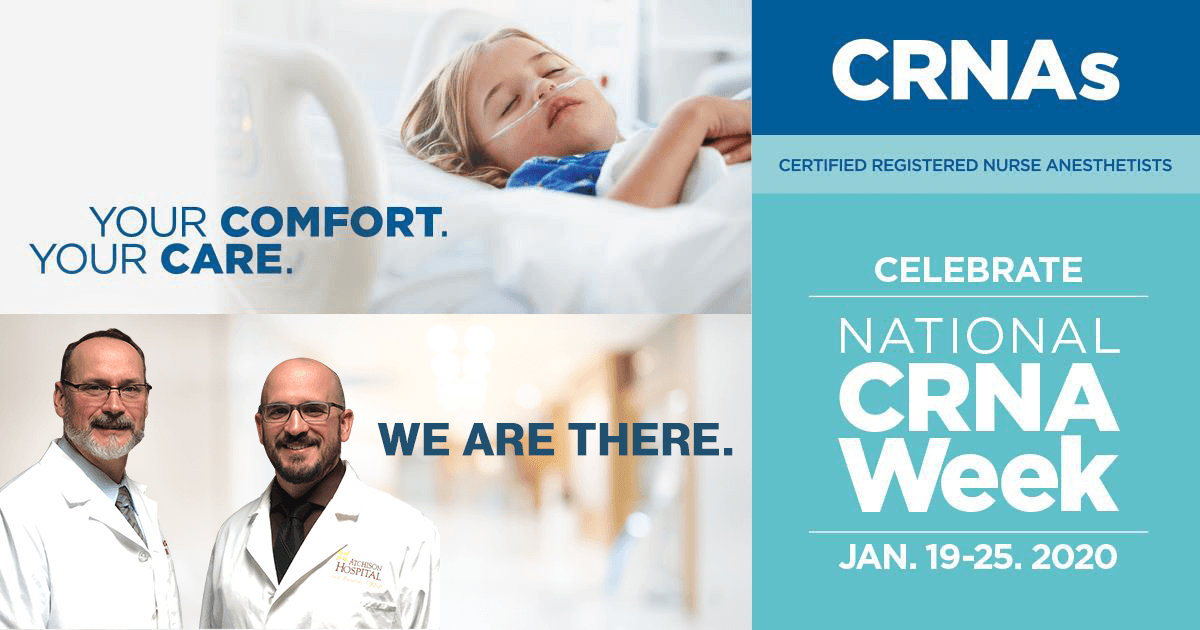Certified Registered Nurse Anesthetists (CRNAs) will be educating the public about the role CRNAs take in providing safe and effective anesthesia care for every patient during the 21st annual National CRNA Week celebration taking place January 19-25, 2020.
CRNAs’ emphasis on safe, effective anesthesia care highlights one of the many hallmarks of nurse anesthesia; in fact, it is the motto of the American Association of Nurse Anesthetists (AANA).
Five ways CRNAs make a difference every day include:
1. Safety First: CRNAs are highly trained anesthesia professionals who safely administer more than 49 million anesthetics to patients each year in the United States, according to the AANA 2019 Practice Profile Survey.
2. Rural America: CRNAs are the primary providers of anesthesia care in rural America, enabling healthcare facilities in these medically underserved areas to offer obstetrical, surgical, pain management and trauma stabilization services. In some states, CRNAs are the sole providers in nearly 100 percent of the rural hospitals.
3. Military Presence: Nurse anesthetists have been the main providers of anesthesia care to U.S. military personnel on the front lines since WWI. Nurses first provided anesthesia to wounded soldiers during the Civil War.
4. Practice Settings: CRNAs practice in every setting in which anesthesia is delivered: traditional hospital surgical suites and obstetrical delivery rooms; critical access hospitals; ambulatory surgical centers; the offices of dentists, podiatrists, ophthalmologists, plastic surgeons and pain management specialists; and more.
5. Cost-Efficiency: Managed care plans recognize CRNAs for providing high-quality anesthesia care with reduced expense to patients and insurance companies. The cost-efficiency of CRNAs helps control escalating healthcare costs.
Atchison Hospital has two full-time CRNAs that provide anesthesia services from the emergency department to the operating theater, from infants to seniors to include acute and chronic pain management. As a matter of fact, in 2018, over 1500 anesthetics were provided at Atchison Hospital in the above mentioned areas and 70% of those patients were cared for by CRNAs. “It is an honor and a privilege to take our patients through anesthesia and a safe surgical experience,” said Charlie Wilson, CRNA. “Surgery and anesthesia can be intimidating, but we take pride in staying with our patients, administering their anesthetics and watching over their vital signs – advocating for them throughout surgery. We take great pride in being there for every breath, every beat, and every second of their anesthetic.”
“The nurse anesthesia profession actually began more than 150 years ago during the American Civil War. Since then, we have taken great pride in administering safe, high-quality anesthesia with the level of care and compassion that is synonymous with being a nurse,” said Dr. David Hart, DNP, CRNA, NSPM-C. “In today’s healthcare climate, CRNAs are the key to the future of anesthesia care, as there is an increasing demand for highly qualified, non-MD/DO healthcare specialists who can ensure access to patient care that is both extremely safe and cost-effective. Through this campaign, we aim to highlight the valuable role that CRNAs play today and will continue to play tomorrow.”
